Exploring Meraki Inc.: Innovations in Cloud IT Solutions


Intro
Meraki Inc., a subsidiary of the renowned Cisco Systems, has carved a significant niche in the cloud-driven IT solutions arena. In an age where digital transformation reigns supreme, Meraki's suite of products stands as a testament to innovation and adaptability in networking. This section aims to tease apart the core of Meraki's offerings, exploring how the company has emerged as a driving force behind modern enterprise networking, particularly through its innovative hardware and software solutions.
As we journey through this exploration, we'll see how Meraki has successfully integrated user-friendly design with powerful functionality. This approach has not only enhanced operational efficiencies for businesses but has also transformed the user experience in IT management. Let's delve deeper into the specifics that make Meraki a pivotal player in today’s fast-paced tech landscape.
Foreword to Meraki Inc.
In today’s fast-paced world of information technology, businesses face ever-increasing demands for efficient, scalable, and secure networking solutions. This is where Meraki Inc. steps in, a name that echoes within the corridors of tech innovation. Meraki, a subsidiary of the tech giant Cisco Systems, has made significant strides in providing cloud-driven IT solutions that cater to various sectors.
The importance of delving into Meraki's operations lies not only in understanding its extensive array of hardware and software offerings but also in recognizing how these solutions shape the landscape of modern connectivity. The company's products turn the complex task of network management into a more accessible endeavor, allowing businesses, whether large or small, to harness the power of the cloud for their networking needs.
Key Elements of Meraki's Offering
One of the standout features of Meraki is its ease of use. Imagine trying to set up an extensive network, manageable from a single dashboard without the hassle of traditional complexities. This cloud management approach enables users to monitor, manage, and troubleshoot their networks from anywhere in the world, truly showcasing the value of remote accessibility.
The benefits extend beyond mere functionality. There's a pronounced focus on security, an increasingly vital component in today’s digital-first world. With the frequent rise in cyber threats, Meraki's robust solutions include integrated security appliances, ensuring that businesses can safeguard their data while still benefiting from a streamlined user experience.
Considerations
While Meraki's appeal is apparent, it’s crucial to consider factors like dependencies on cloud connectivity and potential costs associated with cloud-based solutions. Businesses might need to weigh the convenience of cloud management against the risk of outages or bandwidth limitations. Also, understanding a vendor's pricing model accurately can save companies from unexpected expenses in the long run.
"To successfully leverage technology, it’s not just about having the tools; it's also about understanding how to use them effectively within your unique business context."
Relevant Links
Overview of Meraki's Evolution
Understanding the evolution of Meraki Inc. is crucial to grasping its current role in the tech landscape. This journey—from its inception to its acquisition by Cisco—highlights key milestones that shaped its innovative trajectory. It not only paints a picture of where Meraki stands today but also provides insight into the guiding principles and vision that have driven its growth. The importance of examining Meraki's evolution lies in recognizing the strategic decisions and shifts that influenced its product offerings and market strategies.
Founding and Initial Vision
Meraki was founded in 2006 by a group of students from the Massachusetts Institute of Technology (MIT) who aimed to simplify networking. Their mission was clear: to make wireless networking easy for everyone, from small businesses to large enterprises. By leveraging a cloud-based model, they sought to eliminate the traditional complexities associated with network management. This innovative approach not only distinguished Meraki from competitors but also addressed a glaring gap in the market for straightforward networking solutions.
One can’t forget that the original vision was centered around empowering users. The idea was to create a seamless experience—where accessing and managing networks became almost second nature. With the release of their first products, the Wireless Access Points, the company began to gain traction as it demonstrated that robust performance could coexist with user-friendly interfaces.
Acquisition by Cisco
In 2012, Meraki took a monumental leap forward by being acquired by Cisco Systems. This acquisition marked a significant turning point, as Cisco recognized the potential of Meraki's innovations in cloud networking. By integrating Meraki’s technology into its extensive portfolio, Cisco aimed to bolster its foothold in the growing cloud market.
The acquisition allowed Meraki to leverage Cisco’s vast resources and industry expertise while retaining its entrepreneurial spirit and innovative culture. This merger was not without challenges; however, it positioned Meraki to scale rapidly. The collaboration enabled the development of new products that combined Meraki’s user-friendly design with Cisco's stability and security. The resulting synergy has made Meraki a vital player in network solutions today, further solidifying its presence in sectors like education and healthcare.
"Meraki's integration into Cisco has enabled it to combine agility and innovation with the depth of resources only a giant like Cisco can offer."
The evolution of Meraki—from a small startup to a subsidiary of a tech titan—offers valuable lessons about adaptation, vision, and strategic alignment in technology-driven markets. This progression not only illustrates the importance of fostering innovation but also emphasizes the value of partnerships in achieving sustained growth.
Product Portfolio: A Technical Assessment
Understanding Meraki's product portfolio is key to grasping the company's impact in the IT landscape. Known for its simplicity and efficiency, the portfolio stands out in merging hardware and software to facilitate seamless network management and security solutions. In a digital age where businesses are increasingly cloud-driven, Meraki’s offerings enable organizations to enhance their connectivity and operational effectiveness.
Networking Hardware
Wireless Access Points
Wireless Access Points (WAPs) play a pivotal role in establishing reliable wireless networks, and Meraki's range shines brightly in this category. One key characteristic is their ability to manage bandwidth effectively, thus ensuring stable internet connectivity across a wide area. A standout feature is the auto-provisioning capability, allowing for easy setups without extensive technical knowledge.
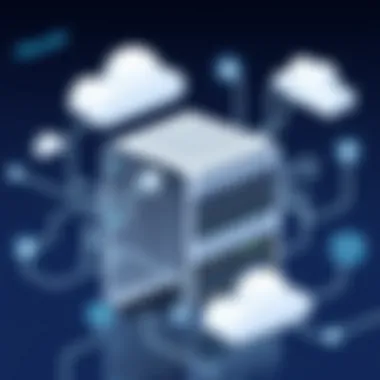
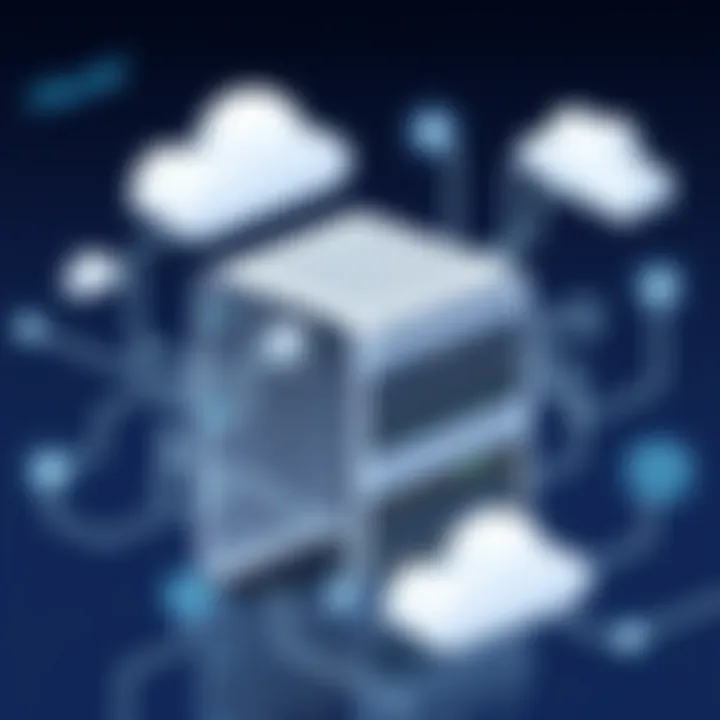
This ease of deployment makes WAPs particularly appealing for small to medium enterprises looking to simplify their networking solutions. However, while these points often come with excellent coverage, the reliance on cloud management may cause concerns regarding downtime if internet access is lost. Still, the overall benefits largely outweigh these disadvantages, making them a popular choice.
Switches
Switches are the backbone of network infrastructure, allowing seamless data flow across devices. Meraki’s switches impress with their stackable design which boosts scalability. A defining feature is their cloud-based management, enabling users to monitor and configure the network from anywhere, using an intuitive dashboard.
This capability significantly reduces the necessity for on-site IT personnel, which can be a game-changer for smaller IT departments. Nonetheless, some critics argue that the life-cycle management feature might not be as robust compared to traditional, hardware-centric options. Regardless, Meraki switches efficiently meet the demands of modern networking.
Security Appliances
Security is a critical concern for any organization, and Meraki’s security appliances are designed to mitigate risks. Their integration of both firewalls and extensive threat intelligence is a highlight, offering proactive defenses against cyber threats. A key trait is the virtual security approach, which automatically updates security rules and policies based on the latest threat landscapes.
While the convenience is undeniable, some may find the reliance on regular internet connectivity challenging during outages, as local configurations can become tricky. Still, these appliances provide valuable peace of mind, reinforcing the notion that effective security measures can and should be easy to implement.
Cloud Management Software
Dashboard Features
Meraki's dashboard serves as the central hub for managing their hardware, offering a user-friendly interface that is accessible from various devices. This feature allows IT teams to easily monitor network performance and traffic patterns, facilitating quick troubleshooting when issues arise.
One of the noteworthy aspects is the visibility it provides into device performance, which can help pinpoint potential bottlenecks before they become larger issues. However, some users might find the wealth of information overwhelming, leading to a steep learning curve initially, even as they enjoy long-term benefits.
Analytics Capabilities
The analytics capabilities within Meraki’s cloud management software are designed to provide deep insights into user behavior and network performance, which can be instrumental for strategic decision-making. One critical feature is the ability to track user engagement through heat maps, showing where most traffic occurs within a facility.
For organizations keen on enhancing user experiences, this tool is invaluable. However, the data collection practices might raise concerns about privacy, particularly in sensitive environments. Despite this, the benefits afforded by these insights often justify the trade-offs for many organizations.
Security Solutions
Threat Detection
Threat detection mechanisms in Meraki solutions are geared towards assessing real-time risks to network security. Meraki employs advanced algorithms to recognize unusual patterns and potential threats quickly. This feature empowers businesses to act proactively rather than reactively when confronted with security issues.
A primary advantage here is the reduced necessity for manual oversight since many features operate autonomously. Nevertheless, there are scenarios where human intervention might still be necessary for nuanced threats, but overall, these systems bolster security significantly.
Data Privacy Features
In an age riddled with data breaches, Meraki emphasizes data privacy across its solutions. The company offers built-in, robust encryption features designed to safeguard sensitive information both at rest and in transit. This characteristic proves essential for organizations handling sensitive data, establishing trust among clients and partners alike.
Still, while there is significant loyalty toward these features, skeptics of cloud-managed solutions might question how data is stored and accessed outside local servers. Nonetheless, those prioritizing security find solace in Meraki’s stringent privacy protocols.
Market Positioning and Customer Base
The market positioning of Meraki Inc. plays a critical role in discerning its strategy within the fast-paced realm of cloud-driven IT solutions. Understanding its customer base allows insight into how Meraki tailors its products to meet diverse needs across various domains. Focusing on customer requirements ultimately translates into tangible benefits for the organization, such as enhanced loyalty and a lasting brand reputation.
Target Markets
Enterprise Solutions
Meraki's approach to enterprise solutions stands out due to its seamless integration of hardware and software. This blend prevents headaches associated with disjointed systems and offers a more cohesive experience for businesses. A hallmark of Meraki’s enterprise solutions is the intuitive cloud dashboard, which streamlines the management of networks.
The key characteristic of enterprise solutions is their scalability. Companies can start with a minimal setup and expand as necessary, permitting businesses to grow without disrupting existing systems. This adaptability is a significant advantage because it minimizes upfront investment costs while allowing future-proofing against unexpected growth.
Unique Feature: The centralized management feature stands out as a game changer. With this, IT teams gain a holistic view of their entire network environment, making it easier to spot potential issues before they spiral out of control. However, relying heavily on cloud solutions might present vulnerability to connection issues for some enterprises, meriting consideration in the planning phase.
Education Sector
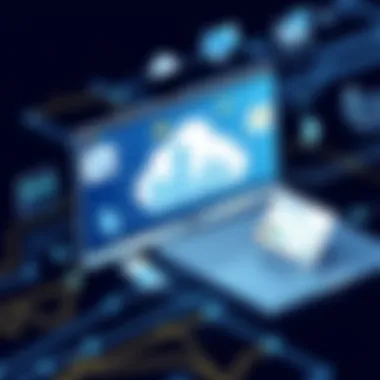

In the education sector, Meraki's offerings help facilitate a connected environment, crucial for today’s digital learning atmosphere. Institutions benefit from reliable connectivity that supports various online learning platforms and educational tools. What’s more, the intuitive interface allows even non-technical staff to manage devices effectively.
A great advantage of Meraki in education is its focus on security. With the advent of remote learning, safeguarding student data and ensuring secure access to resources is non-negotiable. Schools and universities find comfort in Meraki’s strong security protocols, a feature that draws them to its solutions.
Unique Feature: Cisco Meraki's ability to implement robust wireless configurations without extensive hardware investments allows institutions to adapt quickly to fluctuating student needs. Yet, this can come with certain disadvantages; the reliance on online resources might become problematic during outages, impacting learning if contingency plans are not in place.
Healthcare Applications
Healthcare applications represent a crucial segment where Meraki can shine. In a field where both reliability and security are paramount, Meraki’s solutions allow for seamless communication between various stakeholders—patients, healthcare providers, and third-party service vendors.
One key characteristic of Meraki’s healthcare offering is its compliance with health regulations like HIPAA. This compliance assures clients that their sensitive data is treated with the utmost care. Furthermore, the ability to deploy network infrastructure quickly is an unmistakable benefit, particularly in times of crisis or when establishing temporary facilities.
Unique Feature: The ability to monitor network usage aids healthcare organizations in identifying unauthorized access promptly, thus enhancing data safety. However, integrating these systems may involve complexities, which, if mishandled, could lead to potential gaps in security and management.
Client Success Stories
Meraki's ability to cater to varying industries shines through its many client success stories. Companies across the spectrum illustrate how Meraki’s solutions fit into their operational fabric. For example, by employing Meraki's technology to streamline their operations, a leading university achieved an uplift in student engagement through improved access to educational resources.
Furthermore, various healthcare providers have cited significant reductions in network downtimes, allowing them to focus on patient care instead of infrastructural issues. Each story enriches the narrative of how Meraki integrates into complex environments and enhances organizational capacity.
"Utilizing Meraki allowed us to provide uninterrupted teaching during a worldwide transition to remote learning, a task we feared would be insurmountable prior." - University Administrator
Technological Innovations at Meraki
In the fast-paced world of technology, staying ahead means constantly evolving – and that’s where Meraki shines. This segment of the article delves into the innovative strides Meraki Inc. has made, especially through the adoption of cutting-edge technologies like Artificial Intelligence (AI) and the Internet of Things (IoT). Both of these aspects play pivotal roles in enhancing efficiency, improving user experience, and driving the company’s success in an increasingly competitive landscape.
Adoption of AI and Machine Learning
AI and machine learning are not just buzzwords anymore; they represent the backbone of modern technological advancement. Meraki has successfully integrated these technologies into its networking solutions, leading to transformative changes in the way organizations manage their IT infrastructure. The company's AI capabilities help in automating tasks that once required tedious manual effort, thus streamlining operations and reducing error rates.
Some of the notable benefits include:
- Predictive Analytics: By leveraging data collected from various network points, Meraki can anticipate potential issues before they arise. This proactive approach can significantly minimize downtime and enhance user satisfaction.
- Intelligent Identification: AI helps in distinguishing between legitimate users and potential threats, fostering a more secure environment for businesses to operate in.
- Resource Management: Machine learning algorithms are able to analyze usage patterns and optimize resource allocation, ensuring that networks run smoothly without unnecessary bottlenecks.
Incorporating AI features into Meraki products means users don't just get a piece of hardware; they receive a smart solution that adapts and learns over time. These innovations put businesses in the driver's seat, enabling informed decisions based on real-time data.
IoT Integration
The Internet of Things has revolutionized the way devices communicate and share data. Meraki has positioned itself as a leader in integrating IoT within its networking solutions. This capability allows organizations to connect diverse devices seamlessly, enhancing operational efficiency through interconnected networks.
Some key aspects of IoT integration at Meraki include:
- Scalability: As businesses grow, they often bring new devices onto their networks. Meraki’s IoT solutions support a wide range of devices without compromising performance.
- Interoperability: The ability of different devices to work together is crucial. Meraki’s IoT architecture allows for smooth communication between varied devices, improving overall system functionality.
- Enhanced Data Collection: With more devices connected, the volume of data available for analysis increases. Meraki’s systems are equipped to handle large datasets, turning stored data into actionable insights.
"Connecting devices isn't just about networking. It's about creating an ecosystem that adapts to user needs."
Challenges Facing Meraki
In the fast-paced world of technological advancement, Meraki Inc. is not immune to challenges that demand strategic consideration. Understanding these challenges is critical in evaluating the company's future trajectory as well as its current market position. The tech industry is replete with turmoil and rapid shifts, making it paramount for Meraki to navigate both the competitive landscape and the regulatory domain effectively. As organizations move to the cloud and demand more from networking solutions, the pressure mounts on Meraki to innovate while staying compliant.
Competitive Landscape Analysis
Meraki occupies a significant niche in the networking ecosystem, yet it finds itself in competition with established giants such as Cisco, Arista Networks, and Juniper Networks. This landscape is constantly evolving, and Meraki's cloud-managed solutions appeal particularly to businesses looking for simplicity and ease of use. However, the competition is fierce, often vying for the attention of enterprise clients who require robust and highly scalable systems.
One key aspect of this competitive analysis is understanding how Meraki differentiates its offerings. While many competitors focus on solely hardware or operational aspects, Meraki often combines hardware with the ease of cloud management, which is a notable selling point. Yet, competitors have begun to catch on. For example, Ubiquiti has entered the market with compelling alternatives, attempting to capture the attention of budget-conscious companies. These competitors may offer lower initial costs, which could sway prospects who are sensitive to price.
Moreover, Meraki must also adapt to emerging players who may offer cutting-edge technological innovations at lower costs. The proliferation of open-source networking solutions adds another layer of complexity. As IT departments evaluate various options, Meraki needs to communicate its unique value proposition clearly — an area where continuous investment in marketing and user education becomes key. Also, as businesses increasingly prioritize cybersecurity, showcasing a solid security feature set will be critical to retaining client trust and attracting new customers.
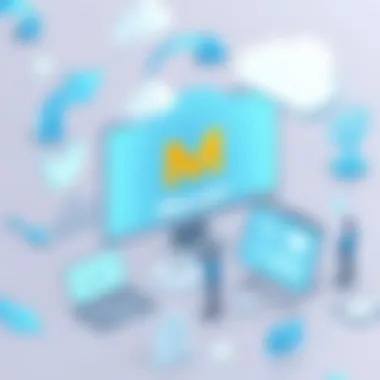
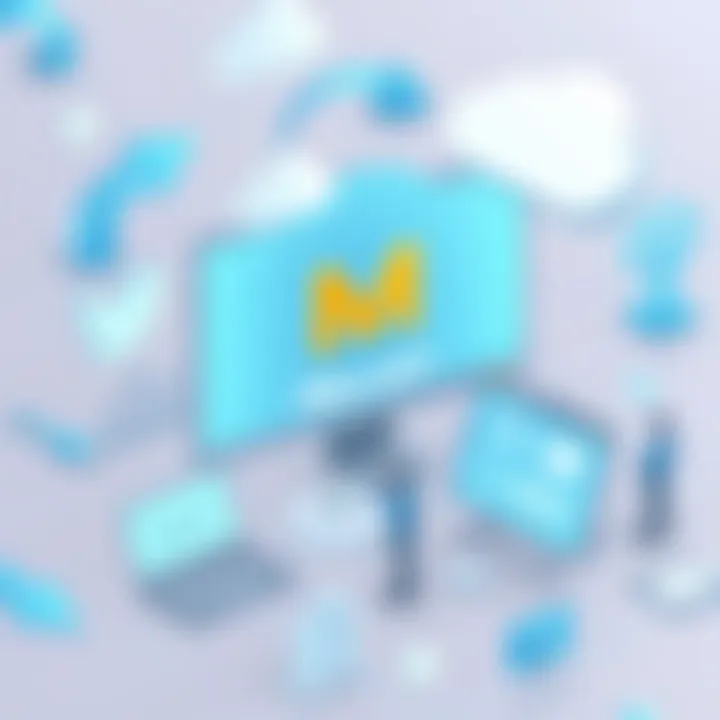
Regulatory and Compliance Issues
Compliance represents an ever-growing concern for tech companies, and Meraki is no exception. The landscape of regulations is continually shifting, driven by the increasing emphasis on data privacy and security. Legislations like the General Data Protection Regulation (GDPR) in Europe and various regulations in North America present a thick web of considerations for Meraki’s operations.
Understanding these legal frameworks is crucial for Meraki, especially as more businesses turn to cloud-managed solutions for their networking needs. The onus is on Meraki to ensure that its services adhere not only to local laws but also to the diverse regulatory environments in which its clients operate. This task can become burdensome, affecting both agility and innovation.
Additionally, clients in sectors such as healthcare and finance face stricter regulations. Meraki needs to navigate specific compliance requirements related to protecting sensitive data in these fields. Lack of compliance could not only lead to hefty fines but also damage the brand's reputation, which can be a serious detraction in an already competitive market. Factors to consider include:
- Understanding data sovereignty: Where is client data being stored and processed?
- Implementing adequate encryption and access controls: Clients need to ensure that their data is secure from potential breaches.
- Regular audits and updates: Ensuring products and services meet compliance standards through routine assessments.
By addressing these compliance issues, Meraki not only safeguards itself but enhances its attractiveness to potential clients, who increasingly prioritize working with vendors that exhibit a high level of compliance and security awareness.
To sum up, the road ahead presents Meraki with a series of hurdles, but by recognizing the competitive landscape and paying heed to regulatory issues, the company can build robust strategies to thrive amidst the turmoil.
Future Outlook for Meraki Inc.
Looking ahead, the future of Meraki Inc. appears filled with potential and opportunities. As technology continues to evolve at a breakneck pace, companies like Meraki must stay attuned to market shifts, customer needs, and disruptive innovations. The insights gathered in this section do not just hint at where Meraki is headed but highlight the strategic choices it may make in the coming years.
Emerging Trends in Networking
Remote Work Solutions
The shift to remote work has become a cornerstone of modern business operations. For Meraki, developing solutions that cater to this new norm is paramount. Remote Work Solutions offer seamless connectivity, enabling employees to collaborate in real-time from virtually any location. Ideal for flexibility, these solutions ensure security and accessibility, which are vital in today's interconnected world.
One key characteristic of these solutions is their user-friendly cloud management. This feature ensures easy setup and maintenance, allowing businesses to focus on their core tasks without the headaches of intricate infrastructure management. A unique aspect of Meraki's offerings in this domain is their mobile device management capabilities, which can track devices and push security updates effortlessly. This can significantly reduce the risks associated with remote access.
However, it's not all smooth sailing. Potential downsides might loom, such as increased vulnerabilities due to varied usage environments. But overall, the flexibility, cost efficiency, and scalability presented by remote work solutions make them an attractive choice for many enterprises, aligning perfectly with Meraki's forward-looking strategy.
5G Implementation
Next up is the transformative power of 5G Implementation, another critical aspect shaping Meraki's agenda. The advent of 5G technology promises to unlock faster speeds and more reliable connections, which can enhance everything from video conferencing to IoT applications. This technology can significantly improve data transfer rates, allowing Meraki to expand its service offerings to include real-time analytics and advanced cloud services.
A major feature of 5G is its low latency, which ensures that devices communicate and data is processed almost instantaneously. This characteristic not only enhances user experience but also enriches the opportunities for deploying new applications and services. Moreover, it can enable device densification, where numerous devices can function smoothly in a single space—an essential factor for crowded environments such as schools, hospitals, or large corporate offices.
Nevertheless, challenges remain. The infrastructure required for widespread 5G adoption can be costly and complex. Moreover, some regions still lack the necessary infrastructure to support this transition. Despite these barriers, the advantages brought about by 5G, encouraged by Meraki's innovative drive, suggest a promising avenue for growth in the networking segment.
Predicted Market Growth
As for Predicted Market Growth, Meraki’s positioning suggests that it is set to capitalize on both emerging trends like remote working and 5G technology. Analysts project that the overall networking market will see significant growth, with cloud-driven solutions taking a considerable share.
In 2023, the demand for cloud networking solutions is anticipated to rise markedly. Factors like increased digital transformation initiatives, a surge in the adoption of hybrid working models, and the necessity for enhanced security measures are inflating this growth expectation. Moreover, consumer reliance on robust, interoperable solutions is creating an environment where Meraki's focus on simplicity and functionality is vital.
"The rapid pace of digital transformation is accelerating the adoption of cloud solutions across industries. Meraki is well-positioned to benefit from this upward trend."
In summary, Meraki Inc. stands at a pivotal junction. With the right innovations and a keen eye on market dynamics, it could lead the charge in redefining how networking solutions are approached. The potential for growth seems promising, particularly as the technology landscape evolves, expecting to foster broader opportunities for Meraki and its clientele.
Finale
In summing up the extensive discussion around Meraki Inc., one can’t help but appreciate how pivotal this company is within the realm of cloud-driven IT solutions. It is not merely about the products offered, but also about the transformative changes they have ushered into the networking landscape.
Meraki stands out by marrying innovative hardware with sophisticated cloud management systems, providing seamless integration that enhances user experiences. Whether it’s across large enterprises, educational institutions, or healthcare facilities, the adaptability of Meraki’s solutions is a clear demonstration of their commitment to meeting diverse client needs.
Importance of the The End
The conclusion serves as the backbone of any analytical narrative; it synthesizes the wealth of information presented earlier while delivering insight into the greater implications of the findings. By reflecting on the discussions around Meraki’s technological advancements and positioning in a competitive market:
- Market Impact: This section helps to underline how essential Meraki has become, emphasizing their approach to ensuring network security and ease of management.
- Future Insights: It encourages contemplation of future trends that likely lie ahead in the tech domain, such as the rise of IoT and expanded use of artificial intelligence. For tech enthusiasts, this is an essential takeaway that links Meraki’s current innovations with future expectations.
- Strategic Applications: Furthermore, the conclusion provides a lens through which stakeholders can assess how leveraging Meraki's offerings could positively influence operational efficiency and adapt to ongoing technological shifts.
Benefits and Considerations
In addition, a well-crafted conclusion provides benefits that reach beyond mere summary:
- Clarity and Focus: It draws together complex ideas into a cohesive thought, allowing readers to grasp the core of Meraki's significance.
- Engagement: A strong conclusion lingers in the reader's mind, encouraging further exploration of topics noted within the article, potentially leading to deeper engagement with Meraki’s products and services.
- Encouraging Action: It often empowers readers, calling them to consider how Meraki can fit into their own tech strategies and business solutions.
Thus, the importance of the conclusion in this article cannot be overstated. It does not simply wrap up the narrative; it encapsulates the essence of Meraki Inc.'s journey, innovations, and future outlook. In an increasingly complex technological world, understanding Meraki's role offers invaluable insights that are worthy of attention from tech enthusiasts, casual users, and decision-makers alike.



